The finished garment
Spring has very much sprung with the fading blossoms on the crab apple tree providing the back drop for my new winter coat. Maybe after a few months resting in the wardrobe I will have got over the initial lack of love for the finished coat. Its redeeming feature is the wonderful lining.
You might notice there are no pictures of it buttoned up. That is because it doesn't have buttons yet. I have the buttons just can't decide how I want to make the closure. Favourite idea at the moment is to have a leather fabric loop rather than a buttonhole. Will wait for next winter before I make my final choice.
Worn with Andrea Moore boyfriend jeans and mohair jumper; United Nude Solid Fold shoe in colour mono
The fabric
This is one of the more expensive fabrics I have ever bought at US$69 per yard and the 20% off basically covered the cost of shipping.
In the pictures it looked completely fabulous. When it arrived I was a bit disappointed with how flimsy the knit backing was and to me not strong enough to support the faux fur with any longevity. There were also a few flaws in the fabric (not that I discovered this until many months later when I was cutting out). Despite this I was still excited to make a winter coat with it. The only demotivating factor was that we weren't having a winter, sure we had more grey days than normal but the crisp blue sky winter days were few and far between. In fact my most worn coat this winter has been the Horizontal Hold trench (albeit with an Ecopossum cardi under it on some occasions) which given it is a cotton/acrylic mix and therefore provides very little warmth despite being a heavyweight jacquard indicates how mild winter has been.
In the pictures it looked completely fabulous. When it arrived I was a bit disappointed with how flimsy the knit backing was and to me not strong enough to support the faux fur with any longevity. There were also a few flaws in the fabric (not that I discovered this until many months later when I was cutting out). Despite this I was still excited to make a winter coat with it. The only demotivating factor was that we weren't having a winter, sure we had more grey days than normal but the crisp blue sky winter days were few and far between. In fact my most worn coat this winter has been the Horizontal Hold trench (albeit with an Ecopossum cardi under it on some occasions) which given it is a cotton/acrylic mix and therefore provides very little warmth despite being a heavyweight jacquard indicates how mild winter has been.
Initially I was going to use a plain black warm back coat lining but then I found this perfect polyester satin fabric at a local fabric store. I don't normally like using synthetic fabric but as the faux fur was anything but natural nothing was lost by using this polyester fabric for the lining.
The fabric alterations
Given my reservations about the strength of the faux fur fabric and the fact that I wanted a warm back lining additions were made to both fabrics.For the faux fur it was block fused with a tricot interfacing to retain the original fabric hand. It was tricky to fuse this as the faux fur made the fabric quite lumpy and the iron had to be manoeuvred between the fur to make good contact with the fabric.
For the lining it was block fused with a polyester fusible quilt batting.
The pattern
The Sewing Workshop Era jacket description a loose-fitting, below-waist jacket has high turn-down collar with deep mitred corners, side vent openings extending above waist, one-piece sleeves with deep hems and vents. Two-button front closure and decorative buttons at vent and sleeve openings. All edges finished with wide hems and mitred corners. Wrong side will show.The pattern alterations
The obvious and pretty much the only pattern alteration is that I lengthened the jacket by 23" to create a coat, but keeping the high low hem shape of the original jacket. To determine the extra length needed and the width at the hem edge I measured the Victory Ulysses trench. The side seams have no shaping being a straight line from the underarm to the hem. They would have benefited from some shaping to give more width at the hip.The pattern is designed with a lot of ease so I chose to use the XS size with a finished bust measurement of 46" (meant for a 31" bust) and I am happy with this choice.
The other addition I made to the pattern was to add a welt pocket. Both the design and position on the coat are based on Vogue 1836 an Issey Miyake pattern I have made before.
 |
| Left: front pattern piece; right: back pattern piece |
The lining fabric used the same pattern pieces as the outer garment. The only difference was I omitted the 3⅝" hem around the outer edge of the garment; removed the collar; and added a 2" box pleat at centre back for movement.
The sewing
The first thing sewn was the lining to check that I was happy with the fit including the length. This is when I discovered that the sleeves were too tight at the forearm and reduced the seam allowance.Even though the faux fur fabric was block fused to tricot interfacing it had a tendency to fray so all of the fabric piece edges were overlocked before being sewn together on my little Singer Featherweight.
The pattern instructions were good and easy to follow, although I missed steps and adapted others where I had changed the garment design. The one area where I am still perplexed is the collar. In the pattern instructions and pictures the collar is the same height all the way around but mine is definitely higher in the back. I have no idea what I did to get this significant variation in height.
The welt pocket was sewn using the instructions from V1836, except for two things: (1) I did a double rather than single welt; and (2) I forgot to follow the instructions to enclose the cut edges on one of the pockets and just overlocked the edges of the pocket bags together. It doesn't matter in this coat given it is fully lined but it is a nice touch in V1836 which is unlined. The welt uses a plain back cotton fabric and the pocket bags are the lining fabric.
The real feature of this pattern that I absolutely love is the 3⅝" hem. The ⅝" is folded under then the corners are mitred and the 3" hem turned to the inside and top stitched. My lining fabric goes to the point where the hem is turned up and is fully enclosed by the hem.
Sometimes although I read the description of the garment on the pattern it doesn't actually sink in. Case in point is this coat. The collar is too high at the back which shouldn't be a surprise as the description is "high turned-down collar". Hmm turned down - not what I wanted. So when I finally get around to putting the buttons on I will also undo the collar and reduce the height. Reverse sewing in this fabric is not fun as the stitches pretty much disappear because of the fur and loose fabric weave.
To be completely truthful until I wrote this blog post the coat was more than likely destined to never be worn just live as is in the wardrobe until it was passed on to a charity shop. Now that I have been reminded just how extravagant I was when I bought this fabric, as well as looking at the photos where it seems more wearable (and not a big furry joke) it may get the necessary changes including buttons and be worn. This coat was sewn in September and it really is amazing how differently we can feel about the clothes we make once a little time has passed. Definitely no love at first sight with this make but I can feel it growing on me.
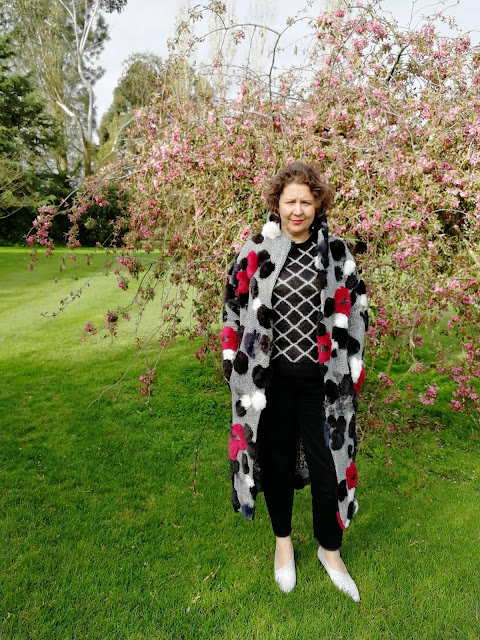
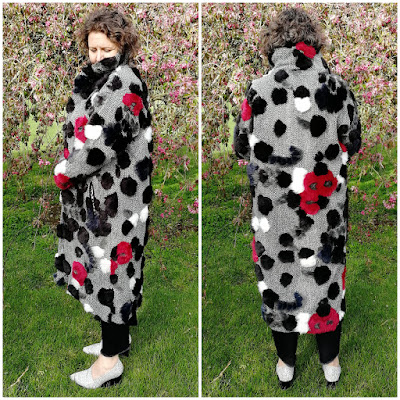

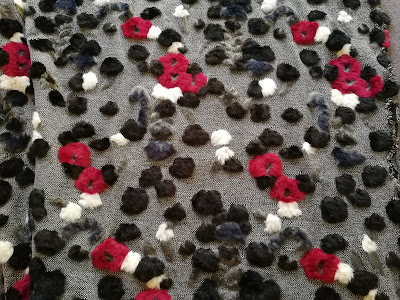
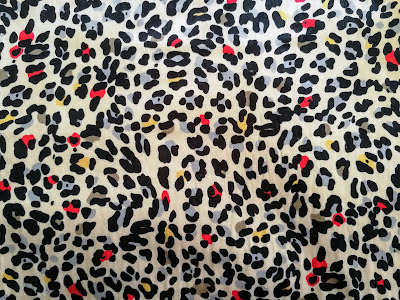



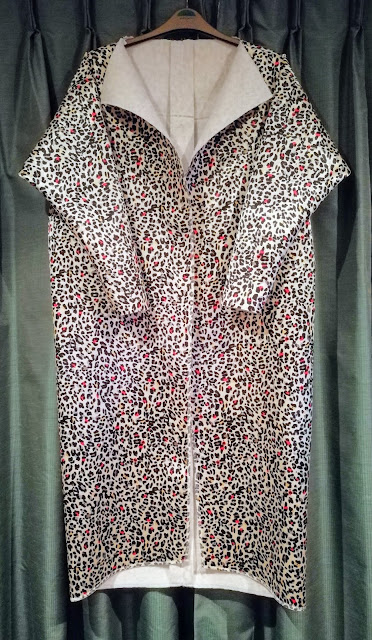




Oh what a fun coat! I've never seen any fabric like it. And you found the perfect lining for it. I like tall collars myself, but maybe you don't need them if it doesn't get that cold where you are. And such a smart idea to do the lining first.
ReplyDeleteThanks Pao I am really hoping the love comes back as I enjoy wearing clothes which are funky.
DeleteA fabulous coat. Sounds like you will be in love with it again by the time winter comes again. Very sensible to sew the lining first for fit.
ReplyDeleteBut too lazy to remove the lining sleeves and cut new ones to fix the problem which was the whole point of using the lining for fit - oh well nothing is perfect in this life.
Delete